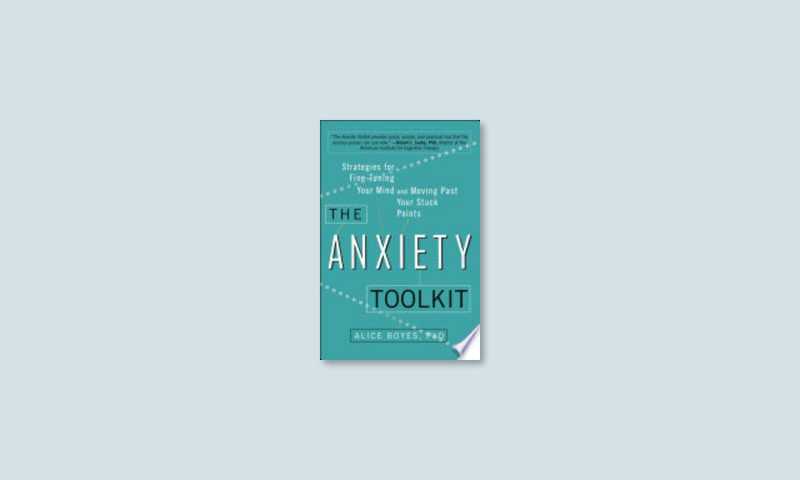
The Anxiety Toolkit by Alice Boyes, Ph.D: A Practical Guide to Reducing Stress and Anxiety
In today's fast-paced world, anxiety and stress have become a common challenge for many individuals. The Anxiety Toolkit, written by Alice Boyes, Ph.D., is a comprehensive guide that offers practical strategies to help people manage their anxiety and stress effectively. The book is based on the author's extensive research and clinical experience, providing readers with a variety of tools and techniques to reduce stress and anxiety in their lives. In this blog post, we will explore some of the key actionable insights from the book that you can apply to your daily life.
Key Takeaways and Actionable Strategies
Understand your anxiety triggers and patterns
To effectively manage anxiety, it is important to first understand what triggers it and the patterns that it follows. This can help you anticipate when anxiety is likely to arise and take preventive measures. Some common anxiety triggers include:
- Uncertainty or unpredictability
- Fear of failure or rejection
- Social situations
- Deadlines or time pressures
To identify your anxiety triggers and patterns, consider the following:
- Keep a journal to track your anxiety levels and the situations that cause them
- Reflect on your past experiences and identify any common themes or triggers
- Talk to a therapist or counselor to gain insights into your anxiety patterns
Develop a toolbox of coping strategies
There is no one-size-fits-all solution to managing anxiety. Instead, it is important to develop a variety of strategies that work for you. Some of these may include:
- Deep breathing exercises
- Progressive muscle relaxation
- Mindfulness meditation
- Cognitive restructuring (challenging negative thoughts)
- Exposure therapy (gradually facing your fears)
To create your anxiety toolkit, try the following:
- Experiment with different coping strategies and see what works best for you
- Practice these techniques regularly, even when you are not experiencing anxiety
- Have a plan in place for when you feel anxious, so you know which strategies to use
Establish healthy lifestyle habits
Maintaining a healthy lifestyle can have a significant impact on your mental well-being, making it easier to manage anxiety. Some healthy lifestyle habits to consider include:
- Regular exercise
- Adequate sleep
- Balanced diet
- Stress management techniques (e.g., yoga, Tai Chi)
- Social support
To establish healthy habits, consider the following:
- Set realistic goals for yourself and work towards them gradually
- Establish a daily routine that incorporates these habits
- Seek support from friends and family to help you stay accountable
Learn to tolerate uncertainty
Uncertainty is a common trigger for anxiety, and learning to tolerate it is essential for effectively managing anxiety. Some strategies for dealing with uncertainty include:
- Accepting that uncertainty is a normal part of life
- Focusing on what you can control, rather than what you cannot
- Embracing change and viewing it as an opportunity for growth
To become more comfortable with uncertainty, try the following:
- Practice mindfulness meditation to become more aware of your thoughts and feelings
- Engage in activities that require you to embrace uncertainty, such as improvisation or spontaneous travel
- Remind yourself of past instances where you have successfully navigated uncertainty
Challenge negative thinking patterns
Anxiety is often fueled by negative thoughts and beliefs. Challenging these thoughts can help to reduce anxiety levels. Some common negative thinking patterns include:
- Catastrophizing (assuming the worst-case scenario)
- Overgeneralization (believing that one negative event means everything is negative)
- All-or-nothing thinking (viewing situations in black-and-white terms)
To challenge your negative thoughts, consider the following:
- Keep a thought diary to record your negative thoughts and the situations that trigger them
- Identify the thinking patterns that underlie these thoughts
- Develop alternative, more balanced thoughts to counteract the negative ones
Face your fears
Avoidance is a common response to anxiety, but it often reinforces the fear and makes it stronger. Instead, facing your fears can help to reduce anxiety over time. This can be done through a process called exposure therapy, which involves gradually confronting the situations or objects that cause anxiety. To face your fears, try the following:
- Make a list of your fears, ranked from least to most anxiety-provoking
- Create a plan for gradually facing each fear, starting with the least anxiety-provoking and working your way up
- Practice relaxation techniques before and during exposure to help manage your anxiety
Seek professional help
If your anxiety is significantly impacting your daily life, it may be helpful to seek professional help. A therapist or counselor can help you identify the underlying causes of your anxiety and develop a personalized treatment plan. Some evidence-based treatments for anxiety include:
- Cognitive-behavioral therapy (CBT)
- Acceptance and Commitment Therapy (ACT)
- Dialectical Behavior Therapy (DBT)
To find professional help, consider the following:
- Ask your primary care doctor for a referral
- Contact your insurance provider for a list of covered mental health providers
- Search online directories or local support groups for mental health professionals in your area
Conclusion
Managing anxiety and stress effectively is essential for maintaining overall well-being. By understanding your anxiety triggers and patterns, developing a toolbox of coping strategies, establishing healthy lifestyle habits, learning to tolerate uncertainty, challenging negative thinking patterns, facing your fears, and seeking professional help when needed, you can significantly reduce anxiety and improve your quality of life. The Anxiety Toolkit by Alice Boyes, Ph.D., offers a wealth of actionable insights to help you achieve this goal.